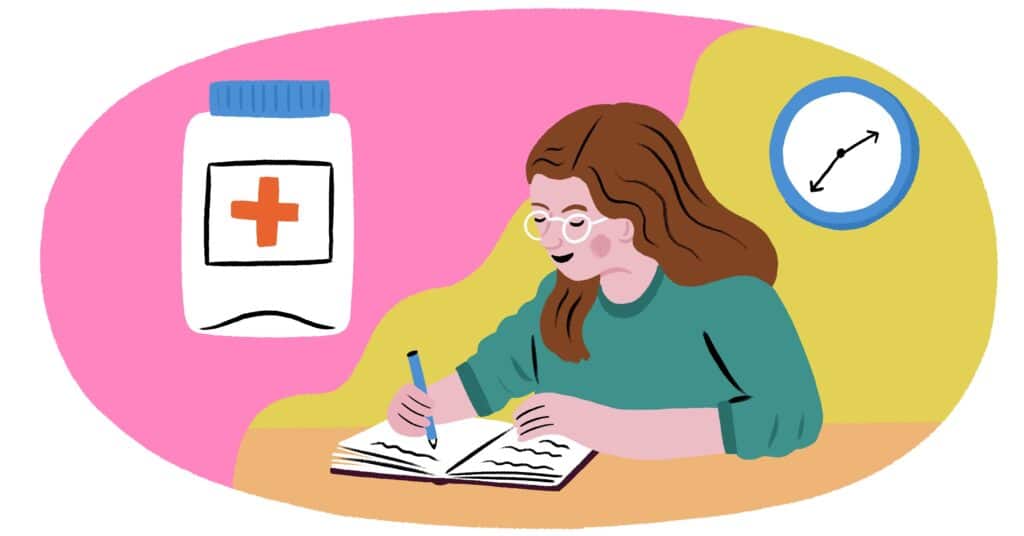
Tyler Dorsey is an ADHDer turned ADHD life coach. She is excited to be able to share all things ADHD with our readers through the lens of her personal and professional experience.
By Tyler Dorsey
Managing ADHD is more than taking medication and having accommodations in school. As a matter of fact, both of those are only tools in the tool box — neither are “fixes” for ADHD.
Medication helps our brain to have more focus. But many of my clients describe being on medication as more focused chaos. We have all this extra focus but we still lack the tools to prioritize, get started (on what we should be doing), maintain organization and remember what we walked upstairs to do.
Accommodations are similar. The most common accommodation I see for students is extended time. Those of us with ADHD are time blind; we do not know how to properly manage time. I can tell you that for me, having extended time was just more time to procrastinate. Just because I had the extra time didn’t mean I had the tools to properly use that time.
Medication is a great tool, as are accommodations. However, to get the most out of these tools, we have to lay a solid foundation of understanding our ADHD and then build on the executive function skills we lack. Those include time management, planning, prioritizing, getting started, attention and memory.
When I was in college, I relied heavily on my medication. As a matter of fact, I forgot to take it before a volleyball game in college. Before I knew it, a ball had been served across the net and my attention was focused on the little kid playing with a red toy truck on the other side of the gym. I completely missed the ball and … let’s just say I had never been pulled out of a game so fast and my butt was sprinting through the campus to catch our bus so I could get my medication (in tears, I might add).
I can tell you from experience it is not a confidence booster to feel like you are only successful when you take your medication. Especially not when others point out when you haven’t taken it.
To start thriving with ADHD, we need to start believing we can do this and don’t need to rely on any one tool for our success. We need to take a step back from all the things we believe we should be doing with our lives and trust that we are doing the best we can with what we have at this moment.
I’m saying all of this and I can imagine that, if you are in the throes of ADHD chaos, you are thinking to yourself: “This all sounds great but how do I make this happen when I am just trying to stay afloat?”
My answer to you: baby steps. Rome wasn’t built in a day and changing years of ADHD habits will take time. But change will come if you start today.
When we are working with our clients, we look at every aspect of their lives and pick the top three areas to focus on to make changes. We work to build tiny habits and be intentional about everything — from where we put our car keys when we get home to what our morning routine is to get out of the house.
Over time, the attention to detail becomes natural and we no longer have to remind ourselves to put the keys in the bowl on the table by the door. We just do it.
Kind of like when your brain goes into auto pilot when you are driving from your house to school or work. We don’t need to think about when to turn. We have done it so many times that it’s just a habit. But, the first time we made that drive, we had to think about which route we were going to take, and reworked it a few times to find the fastest way.
So, what do we do to create habits we have dreamed of?
To start, you need to know what exactly those habits are. Take some time to write out or draw out what you envision your life looking like. Let’s get really clear on what result you are going for. From there, let’s break it into steps. Work backwards and think about each step that needs to be taken to accomplish that result.
Reminder: to make this process successful, we need to focus on one move at a time, not everything at once.
When you think you have it all figured out, take a step back. Give yourself a day to process and then go take a look over these steps again to see what needs adjusting and what you forgot.
Then, pick a small step and get started. This step could be as simple as deciding where you will put your keys every time you get home.
For some of us, getting started is the struggle. If this is the case for you, find an accountability partner who can help you make this happen. That could be a friend, spouse or family member. ADHD Online has access to therapists and my company, Focus Forward, has a team of coaches all ready to help you thrive!






